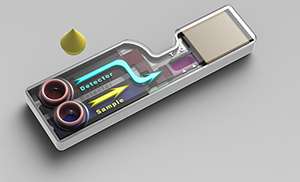Stacking improves paper-based test kits and leads to greater accuracy

Paper-based kits for diagnosing disease from saliva samples will become more versatile and effective thanks to a technical development by researchers from the A*STAR Institute of Bioengineering and Nanotechnology. Their innovation allows better control of the flow and filtering of materials as they move through the diagnostic system1.
A wide variety of test kits, including well-known pregnancy tests, rely on samples of body fluids flowing along paper strips. Potential applications of these systems are limited, however, by unwanted chemical interactions with the paper, or between chemicals in the samples or test reagents. This is a particular problem with saliva, which carries many useful biomarkers of disease. Saliva also contains substances that can interfere with the operation of conventional lateral flow diagnostic systems where everything simply flows along a single paper strip.
Jackie Ying and co-workers have tackled this problem by developing a 'stacking flow' system, whereby the saliva and the detecting reagents initially flow separately, with one flow stream stacked above the other. An impermeable flow regulator film keeps the two streams apart until the optimal point for them to come together. "This allows unnecessary salivary substances to be filtered away before the two streams meet," says Ying.
Ying explains that although multi-flow-path systems already exist, their input paths merge in the same plane of the paper. "This does not allow for uniform flow and mixing," adds Ying, "while stacking the input paths on top of one another ensures uniform mixing and gives us unambiguous results."
Ying's research team was able to demonstrate this new system with a kit that detects antibodies associated with dengue virus infection (see image). Dengue is a leading cause of death and illness in the tropics and sub-tropics. For patients who have already experienced one serotype of the dengue virus, contracting the disease a second time from another serotype can have dire consequences. Using the new kit to detect the presence of dengue antibodies from previous infections could help to identify those patients at greatest risk from secondary infections.
Ying also expects the stacking flow system to have much wider application than just testing for dengue. "We are working on the detection of other infectious diseases," she says, "and our device could also be used for fluid samples other than saliva, such as blood serum or plasma."
The technology is now patented and will be further developed for commercialization.
More information: "A stacking flow immunoassay for the detection of dengue-specific immunoglobulins in salivary fluid." Lab on a Chip 15, 1465-1471 (2015). dx.doi.org/10.1039/C4LC01127A
Journal information: Lab on a Chip



















